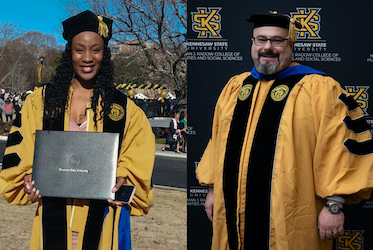
Behavioral treatment of ADHD
KENNESAW, Ga. | Feb 21, 2017
Kennesaw State clinician says benefits are more long term
Children diagnosed with attention deficit hyperactivity disorder (ADHD) and other behavior disorders have shown greater academic improvements after undergoing treatments designed to change behavior than children on medication alone, a psychologist now working with children and families at Kennesaw State University advised.
Allison C. Garefino, Ph.D., clinical director for Kennesaw State’s newly launched Children and Family Programs (CFP), says evidence-based behavioral treatment has shown several advantages over the use of stimulant medications to treat behavior disorders, especially ADHD.
Garefino offered hope to parents of children whose behaviors have caused difficulties for them at school and conflicts with parents, teachers, siblings and peers. She urged parents to watch for symptoms indicating that children may need behavioral treatment.
This month, Kennesaw State’s CFP will begin the first in a series of interactive workshops to equip parents and children with strategies to modify problem behaviors. Garefino described one of the techniques parents and teachers might use to foster a desirable behavior.
The CFP is a service of Kennesaw State’s Center for Conflict Management, in collaboration with the Department of Psychology. For more information on the workshops and other available services, contact Garefino at agarefin@kennesaw.edu or 470-578-2233.
Related Stories
A leader in innovative teaching and learning, Kennesaw State University offers undergraduate, graduate and doctoral degrees to its more than 45,000 students. Kennesaw State is a member of the University System of Georgia with 11 academic colleges. The university’s vibrant campus culture, diverse population, strong global ties and entrepreneurial spirit draw students from throughout the country and the world. Kennesaw State is a Carnegie-designated doctoral research institution (R2), placing it among an elite group of only 7 percent of U.S. colleges and universities with an R1 or R2 status. For more information, visit kennesaw.edu.


















